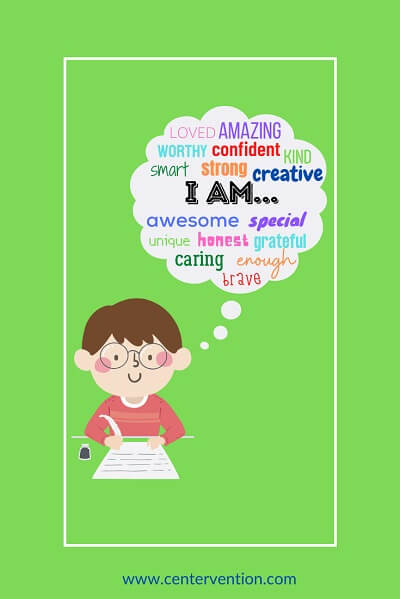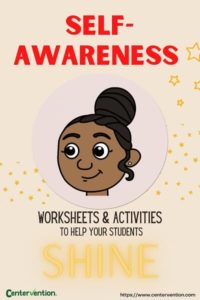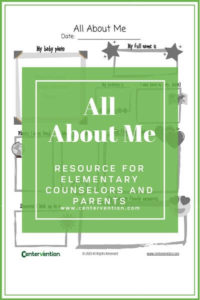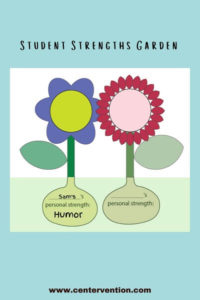The self-esteem worksheets below include the following:
- A self-awareness exercise to help students identify likes and dislikes
- An All About Me activity
- An worksheet to help students identify personal strengths
- And a lesson to learn the differences between perfectionism and self-improvement
But before we dive into the details, we wanted to share a bit of background on what is self-esteem and how we develop self-esteem in the school environment.
What is Self-Esteem?
In their paper, Portraits of the Self, published in 2003, Sedikides and Gress defined self-esteem as an “individual’s perception or subjective appraisal of one’s own self-worth, one’s feelings of self-respect and self-confidence and the extent to which the individual holds positive or negative views about self.”
Self-esteem is not only a reflection of one’s self-worth and confidence but also plays a crucial role in shaping one’s overall mental well-being and resilience in the face of life’s challenges.
And with a measure of responsibility for guiding the social emotional development of students, educators need to focus on self-esteem as a foundational thread that weaves through every aspect of each student’s academic and personal development.
Self-Esteem at School
The school environment is where many children first encounter the challenges of forging connections, navigating academic hurdles, and discovering their unique strengths. Recognizing the importance of self-esteem in this context, we must foster a positive and supportive atmosphere, ensuring that each student feels valued, capable, and accepted.
One of the cornerstones of cultivating healthy self-esteem in elementary school students is creating a classroom culture that embraces differences and celebrates individuality. Students should be encouraged to express their thoughts, opinions, and talents without fear of judgment.
Academic success, while crucial, should not be the sole metric for evaluating a child’s worth. As educators, we must shift our focus from a narrow emphasis on grades to a more holistic evaluation of each student’s abilities and potential. Implementing differentiated instruction that caters to diverse learning styles, acknowledging and celebrating various achievements, whether academic, artistic, or personal, reinforces the idea that success takes many forms.
In this journey towards nurturing self-esteem, effective communication between educators, students, and parents emerges as a linchpin. Regular dialogues about progress, challenges, and triumphs foster a collaborative approach to a child’s development. By involving parents as partners in this process, we create a united front committed to supporting the child’s self-esteem both at home and in the school environment.
As educators, we wield the power to mold not only the intellect but also the spirit of our students, sowing the seeds of self-esteem that will blossom into a future of resilience, self-assurance, and lifelong learning.
Featured Self-Esteem Worksheets
To assist you as you help students improve their self-esteem, we have created several featured lessons, activities, worksheets, and printables. Some may include characters and scenarios from our online SEL interventions. And while you aren’t required to use our online programs in order to use these supplemental lessons, you can request a Free educator account here.
Self-Awareness Worksheets
Using these self awareness worksheets, students will gain a better understanding of their likes and dislikes.
While adults may be more familiar with their own strengths, challenges, and emotions, students’ self-awareness is still in early development throughout the school-age years. Lessons that focus on naming, recognizing, and managing emotions, exploring strengths, setting goals, and sharing likes and dislikes with others through appropriate communication can boost self-awareness.
All About Me
An All About Me worksheet is a great way to kick off the school year as students explore self-awareness and share their personalities and experiences with friends and new teachers.
Although they are most popular in the Fall when classroom communities form, they can be used year-round as a tool to reflect, celebrate growth, and identify new goals, all hallmarks of practicing growth mindset.
Student Strengths
In this lesson, students will create a student strengths flower that highlights their positive traits, and this flower will be added to a student strengths garden that showcases the collective abilities for the entire class.
By creating a student strengths flower, students will: Reflect on their individual strengths, think about a time when they used a strength, consider what positive consequences occurred when they used that strength.
Perfectionism
Unfortunately, some students take their desire for excellence and accomplishment to unhealthy levels, stymieing their work and throwing up roadblocks to their own success.
These children see every school assignment and extracurricular activity as another opportunity to fail. They often fear bad grades and disappointing their teachers and parents, who have high expectations for them. For some students, that drive for perfection can lead to anxiety and depression.




